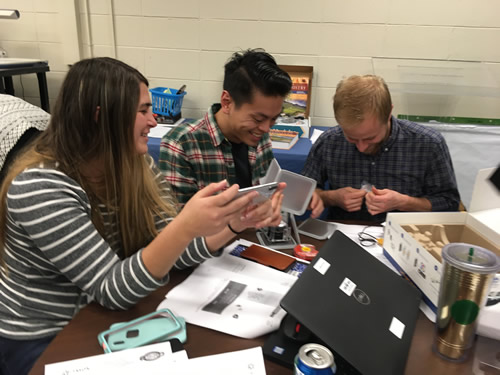Professional development (PD) is more crucial today than ever for educators to stay relevant in the classroom. The fast pace of innovation makes it an ongoing challenge for teachers to stay on top of the latest developments, so they can include the newest topics in their curriculum, particularly in the areas of science, technology, and engineering. Even new teachers struggle because from the moment they graduate from college, their knowledge and skills begin to fall out of date. So, imagine how difficult it is for teachers who have been on the job for five, 10, or 20 years to keep pace with cutting-edge developments.
We have a duty to learn about the latest advances in our fields of study, so we can pass that knowledge on to our students and implement the most effective methods for teaching modern topics and concepts. Doing so allows educators and schools to give students the best education possible in high school—an education that will set them on a path to success in college and career.
That’s why I jumped at the opportunity to attend a two-day PD workshop at the East Bay Educational Collaborative (EBEC) in Warren, Rhode Island. The session was offered as part of a grant that Atlantis Charter School in Fall River, Mass., recently secured for STEM – High School Chemistry from the U.S. Office of Naval Research through the EBEC, which also includes six new lab stations, new textbooks, and new lab manuals. I was excited to learn how it all works because I knew it would not only benefit my career, but also more importantly my students.
The following are my top three takeaways from the STEM PD.
1. I was introduced to new teaching methods of teaching
There is innovation everywhere, and chemistry is no exception. The PD workshop introduced me to the latest “green” approach to chemistry, which I plan to begin weaving into future lesson plans.
The centerpiece of the new program is a small, computer-based lab station. Users can turn on various functions to mimic experimentation and attach various probes, such as a heater that can boil water in a test tube. No more Bunsen burners, which have open flames and burn extremely hot.
The equipment is not difficult to use, but the PD provided me with the training to properly teach my students. The lead instructor led us through several interesting activities during the two-day workshop. He did experiments with us, showed us the electronic and print-based resources that come with the course, and shared ways to use them in the classroom.
2. I got a reminder of what it is like to be the student vs. the teacher
Atlantis Charter School places a strong emphasis on experiential and hands-on learning for our high school students. At the workshop, I experienced the benefits of this approach. We conducted six experiments from the lab activity book. We started each experiment from scratch, and by doing so we learned to set up and properly calibrate the equipment. If we ran into a problem, we learned how to troubleshoot. The repetition allowed us to see how the apparatus works and better understand what users can and cannot do. I left feeling very comfortable in my ability to work and troubleshoot the equipment, and the experience reinforced for me just how effective experiential learning can be.
3. I realized the benefits of collaboration
Not only was the lead instructor an amazing wealth of knowledge (he co-wrote the textbook), but so were my fellow teachers. I spent two days in a room with educators from other schools in New England and as far away as Tennessee and Georgia. We shared ideas and experiences and talked about the different approaches we use to teach our students ideas and concepts related to chemistry. We talked about what works in our classrooms and what doesn’t. The ability to collaborate with fellow chemistry teachers was just as beneficial as learning to use the new equipment. It is also what set the experience apart from PD days held on my school campus. I think we learned just as much from each other as we did from the instructor, and I hope to stay in touch with the teachers I met for years to come. In fact, I think it would be great to invite them to spend a day at my school and see my science lab!
Putting my new skills into place
I returned to school following the workshop better prepared to help my students understand this new green approach to chemistry. With everything in life, there is a learning curve, and it may take some time to integrate everything I learned into my lesson plan, but it was a good experience. The instructors gave me and my colleagues the tools we need to be successful in the classroom.
I am fortunate to teach at a high school where administrators see the value of PD. This opportunity was brought to me, but educators at my school are encouraged to seek out PD opportunities on their own.
Humans, particularly teachers, have an insatiable thirst for knowledge. As educators, we would be remiss if we did not actively seek out new learning opportunities. This STEM PD benefited me, but more importantly, it will benefit my students by helping Atlantis integrate new ideas and concepts into its science curriculum to better prepare our students for 21st-century jobs.
- Harnessing generative AI to revolutionize educator growth - January 17, 2025
- The FAFSA is finally easier–but that’s still not enough - January 17, 2025
- 6 tips to help your school unlock the most value from AI - January 15, 2025

